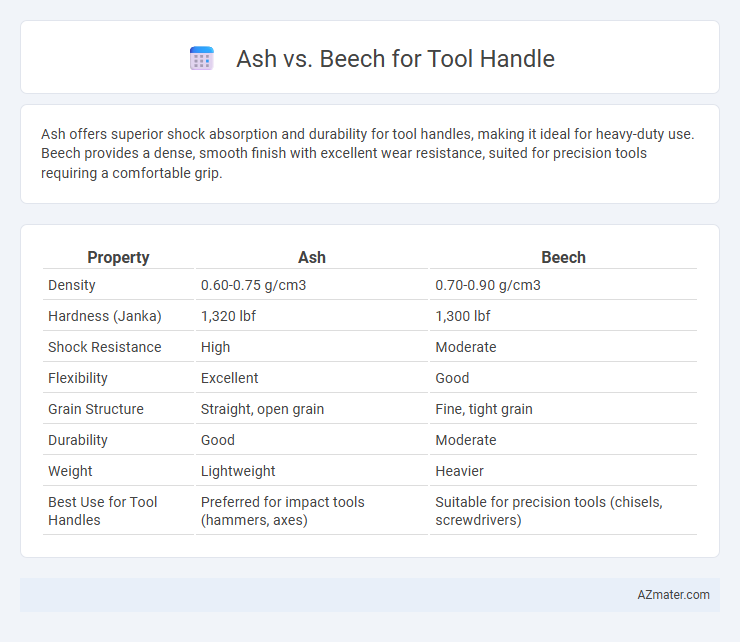Ash offers superior shock absorption and durability for tool handles, making it ideal for heavy-duty use. Beech provides a dense, smooth finish with excellent wear resistance, suited for precision tools requiring a comfortable grip.
Table of Comparison
| Property | Ash | Beech |
|---|---|---|
| Density | 0.60-0.75 g/cm3 | 0.70-0.90 g/cm3 |
| Hardness (Janka) | 1,320 lbf | 1,300 lbf |
| Shock Resistance | High | Moderate |
| Flexibility | Excellent | Good |
| Grain Structure | Straight, open grain | Fine, tight grain |
| Durability | Good | Moderate |
| Weight | Lightweight | Heavier |
| Best Use for Tool Handles | Preferred for impact tools (hammers, axes) | Suitable for precision tools (chisels, screwdrivers) |
Introduction: Comparing Ash and Beech for Tool Handles
Ash and beech are popular hardwood choices for tool handles due to their strength and durability. Ash offers excellent shock absorption and flexibility, making it ideal for tools subjected to impact. Beech provides a dense, fine-grained texture that resists wear and enhances grip comfort during prolonged use.
Wood Grain Structure: Ash vs Beech
Ash wood features a straight, uniform grain structure with open pores that provide excellent shock absorption and flexibility, ideal for tool handles requiring durability and comfort. Beech wood has a fine, tight grain with a smooth texture, offering high hardness and resistance to wear, making it suitable for handles needing robust impact resistance. The open grain of ash allows for better grip and vibration dampening, whereas beech's dense grain ensures long-lasting performance under heavy use.
Strength and Durability: Which Lasts Longer?
Ash wood is renowned for its exceptional strength and shock resistance, making it a durable choice for tool handles subjected to heavy use. Beech offers a fine grain and hardness that provides solid durability but tends to be less resilient under continuous heavy impact compared to ash. Overall, ash handles generally last longer due to their superior toughness and ability to withstand repeated stress without cracking or splintering.
Flexibility and Shock Absorption
Ash wood is renowned for its superior flexibility and outstanding shock absorption, making it ideal for tool handles that require durability under impact stress. Beech wood offers a dense, hard structure with moderate flexibility but less shock absorption compared to ash, which may result in increased vibration transfer to the user's hand. Choosing ash for tool handles enhances comfort and reduces fatigue during prolonged use due to its ability to effectively absorb and dissipate shock.
Weight and Balance in Tool Handles
Ash is favored for tool handles due to its lightweight properties and excellent shock absorption, enhancing user comfort during prolonged use. Beech, while denser and heavier, provides superior strength and durability, contributing to a well-balanced handle with increased control and precision. The choice between ash and beech hinges on striking the optimal balance between weight and handling, with ash offering agility and beech delivering stability.
Workability: Ease of Shaping and Finishing
Ash wood offers excellent workability for tool handles due to its straight grain and moderate hardness, allowing for easy shaping with hand or power tools and smooth finishing without splintering. Beech is also a popular choice, prized for its fine, uniform texture and high density that enable precise shaping and a polished, durable finish. Both woods provide reliable workability, but ash stands out slightly for being lighter and easier to manipulate during the crafting process.
Resistance to Moisture and Rot
Ash wood offers moderate resistance to moisture and is relatively less prone to rot, making it a durable choice for tool handles exposed to occasional damp conditions. Beech wood exhibits lower natural resistance to moisture and rot, requiring proper sealing to prevent degradation when used in humid environments. For applications where exposure to moisture is frequent, ash is preferred due to its enhanced durability and lower susceptibility to fungal decay.
Availability and Cost Considerations
Ash wood is widely available and generally more affordable than beech, making it a popular choice for tool handles in various markets. Beech, though slightly more expensive, offers consistent quality and durability, which can justify the higher cost for specialized or heavy-duty tools. The cost-efficiency of ash combined with its accessibility makes it ideal for mass-produced handles, whereas beech suits applications requiring enhanced shock resistance and finish.
Traditional Uses in Tool Handle Manufacturing
Ash has long been favored in tool handle manufacturing due to its exceptional strength-to-weight ratio and excellent shock absorption, making it ideal for hammers and axes. Beech is also traditionally used, known for its hardness, fine grain, and resistance to splitting, which provides durability and a smooth finish for hand tools like chisels and mallets. Both woods maintain a balance of resilience and comfort, with ash offering flexibility and beech delivering robustness, underpinning their historical preference in crafting ergonomic and durable tool handles.
Conclusion: Choosing the Best Wood for Your Needs
Ash offers superior shock absorption and flexibility, making it ideal for tool handles that require durability and comfort during prolonged use. Beech provides a harder, denser wood that resists wear and offers excellent machining qualities but tends to be less forgiving on impact. Selecting between ash and beech depends on prioritizing either resilience and lightweight comfort or hardness and precision for specific tool handle applications.

Infographic: Ash vs Beech for Tool Handle
 azmater.com
azmater.com